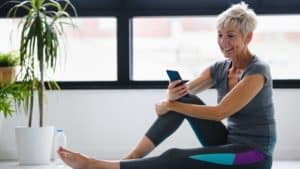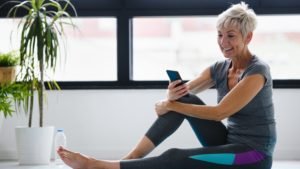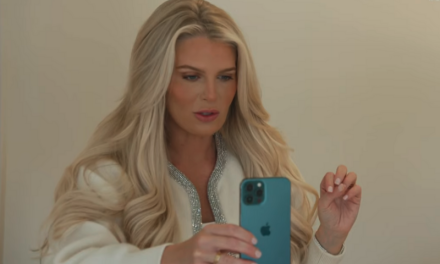
Have you
ever searched online for an exercise video?
If you
want to stay active, feel stronger, improve your balance, feel more flexible or
mobile, then you may have considered or already tried using online exercise
videos.
It’s
convenient because we have so many options to get some exercise done at home,
whether you want to find good stretches for your back, do 5 minutes of balance
training, or even do a full workout class.
But the
challenge is that with choice comes confusion and overwhelm.
You can
spend all the time you planned to exercise just looking for the right video. Or
you start one and then find it’s too challenging or just not what you were
looking for. By then, you don’t have time to look again and you give up for the
day.
Doing
exercises based on online videos can be risky too. You may end up doing an
exercise that isn’t suitable for you, overdo it, or even injure yourself.
I don’t
want this to happen to you. In this article, I will talk you through how to go
about finding and choosing the best online exercise videos for you.
But I Already Go to an Exercise Class!
When I
talk about online exercise videos, many people tell me that they already go to
a class, or they already have some regular movement in their weekly schedule.
It’s not a question of either doing home exercise or going to a class – the best solution is almost certainly
a combination of both.
Doing a short routine at home
in between your class meets will help to maintain or build on some of the gains
you have made in the class. It can also provide variety and help ensure you are
addressing all the components of fitness.
For
example, some of our Studio members walk regularly, so they know they are
getting some cardiovascular exercise. But they also know that they need to do
strength and balance exercises. These are harder to do independently, and it
helps to have someone to demonstrate and talk you through the exercises.
We see the
best results for balance training when we do the exercises most days of the
week. So, having a video that you can do, even if it’s just a few minutes long,
can make this much easier.
Where to Start? Ask Around
To start
your research, ask people you trust for recommendations. Friends, family, online
community –
put the question out there. Many people subscribe to YouTube channels, have
favourite websites with videos, or hold online exercise memberships.
Your doctor,
physiotherapists, physical therapists, osteopaths, or chiropractors might have
suggestions as well. Perhaps their other patients have found some good
resources they can share.
Any personal recommendation will help you to come up with a shortlist and give
you a few options to look into in more detail.
Set Aside Research Time – Don’t Jump Straight In
Realise
that you will need to take some time to research the various options.
Take your
list of recommendations and look around the instructors’ websites, YouTube
channels, and social media. Find out about their background, qualifications,
and specialties. If it’s not clear, get in touch with them and ask. A good
instructor will be happy to share this information with you.
See what
kind of people they have worked with, and who has left testimonials for them.
If you are looking for exercises to help with arthritis, does the instructor
mention this? Do they seem to understand, empathise with, and appreciate your
concerns?
Do they
give different versions of exercises and do they offer modifications if you
have issues? Exercising well can be complex, and it’s important to be working
at the right level for you. If an instructor is fixed on doing things a certain
way and doesn’t give you options, they may not be right for you.
Can You Ask Questions?
Check
whether the instructor takes questions about the exercises. Even with the best
video, you may have questions, and it’s important to be able to get these
answered.
I get a
lot of emails, and while I don’t always get back straight away, I do answer all
the queries. And I am very active in our online Studio,
where I field daily questions from members who want to make sure they are doing
the right exercises at the right level for them.
Being
available for questions is important to me. I know that when you feel 100%
confident that you’re doing an exercise right for you, that is when you will
keep doing it. And we don’t get results unless we keep doing them.
Want to Improve Your
Balance Safely? Look Out for This Red Flag
If you’re
looking for exercises
to improve your balance, make sure that the instructor
recommends standing near a support. If they don’t mention that, then perhaps
they haven’t worked with people who have balance issues or are worried about
falls.
Of course,
you could do the exercises near a support and be fine, but this should make you
wonder what else they don’t know or haven’t thought about. If anything else
along these lines bothers you or makes you wonder about their understanding of
your condition, needs, or goals, then keep looking.
Fast Forward
When you
find someone, whose courses could work for you, have a look at the videos. You
can fast forward through the videos or scroll through and click at different
points in the video. Take a look at the exercises they’re doing and see if it
looks like something you could do.
You might
feel a bit nervous, especially if you haven’t done any exercise like this
before. Don’t let your lack of confidence put you off. If it looks a little bit
hard but you feel confident that you can at least give it a go, then that’s all
right.
However,
if you start looking through the video and the instructor begins doing handstands,
or something similarly crazy, then this may not be the right video for you. That
is, unless your balance is good enough to do the handstands. In that case, keep
watching that video and have fun!
Personal Preference Matters
Just
because your friend Maria (who also has arthritis and wants to keep her joints
moving) likes a video, doesn’t mean you will. Make sure that the individual
style of the instructor works for you.
What about
the music? In our classes and videos, we don’t use music. People work at a
different pace, some people have trouble with their hearing and find it
distracting, so we leave it out. Many love the fact that it’s quiet and they
can concentrate. Some play music at the same time, but it’s their own choice,
and I think that’s great.
Find
videos that you enjoy because you do need to feel comfortable with someone’s
style, with the approach, with the music, and with the setting. Because that’s
what’s going to keep you coming back.
When You Do Start
When you
find videos you want to follow, please start slowly and take it easy. If there
are various difficulty or challenge levels, start on the lowest one and build
up gradually. Even if it feels a bit easy, you could wake up the next day
aching! People tell us that the exercises we do are deceptively simple, and
they don’t expect to feel as ‘worked’ as they do.
If it is a
bit easy for you, you will build up quickly and that’ll be fine. But you won’t
overdo it or risk injuring yourself as a result of early enthusiasm.
Trust Yourself – You Are the Expert!
Finally,
trust your instincts and listen to your body. Even though you’re watching an
expert who is (hopefully) qualified, experienced, and trained to suggest
appropriate exercises, to demonstrate them carefully and give you good advice,
they are not in the room with you.
They don’t
know what it feels like in your joints or your back, and what’s exactly best
for you. So, you need to take a bit more time to get to know your body and how
it feels when you do different exercises.
Your
online instructor may be the expert in the exercises, but you are the expert in
you.
You will
feel more confident committing yourself to an exercise programme with the
knowledge that you know when to push yourself, when to ease off and what’s
right for you.
Check out The Vida Wellness Studio – an online exercise studio for people who want to exercise at home to improve their balance, feel stronger, and move more easily.
What
videos do you like doing at home, and why? How much research do you do before
committing to a program? Do you do home exercises in addition to a class?
Please join the conversation below.





